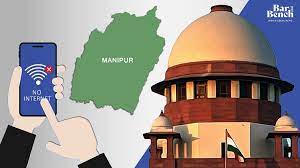Overkill : On the Internet shutdown in Manipur
The Manipur government’s decision to extend the Internet shutdowns lacks merit
The Manipur High Court, on Tuesday, granted limited Internet access in designated places in the State after a petition seeking the restoration of net access. Shutdowns began following the violent conflagration on May 3 and there were extensions of restrictions since then, the last one being an extension order on Wednesday, till June 25. The request made is legitimate as shutdowns have a crippling effect on many an economic activity and livelihoods. Citizens have been unable to access vital services such as e-commerce-related activities, except for those who can get exemptions from the shutdowns with government permission. Violent incidents have occurred in the State since May 3 and relations between Meiteis and Kukis remain tense. But the orders seeking to extend the shutdown cite threats to “ law and order” and the role of “anti-social elements” — a euphemism for extremists indulging in violent acts or the posting of violence-promoting material — rather than explicitly seeking to retain these bans because of a public emergency or in the interests of public safety, as required by Section 5(2) of the Telegraph Act, 1885 and Telegraph Rules. The Manipur government also told the High Court that the shutdowns were needed to block websites where inflammatory material could be published, but such a sledgehammer approach is clearly problematic.
The Supreme Court, in Anuradha Bhasin vs Union of India (2020), had held that an indefinite suspension of Internet services was in contravention to the law as freedom of speech and the freedom to carry out commercial work using the Internet was a fundamental right. It also held that such suspensions should adhere to the “principle of proportionality and must not extend beyond necessary duration”. Continuing a dragnet suspension in Manipur in this fashion suggests that the government is merely using the shutdown as a substitute for enforcing law and order — another ploy that the Court had come down heavily upon in this judgment. The situation in Manipur can be tackled effectively by a regime that seeks to restore the confidence of all stakeholders, engages with civil society actors in restoring inter-community dialogue, isolates the extremists and pursues a step-by-step approach towards restoring peace and normalcy. But with a beleaguered Chief Minister at the helm — a leader who has lost the confidence of many of his colleagues — and the intransigence of many community representatives and their inability to rise above their ethnic identities to pursue peace, sporadic violence continues even as those displaced are unable to return home. This, however, does not lend to the continuation of the Internet shutdown that has been in place for over a month-and-a-half, and which must end.
